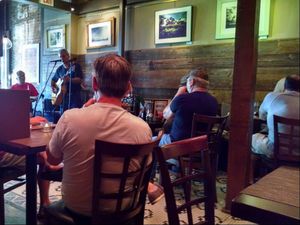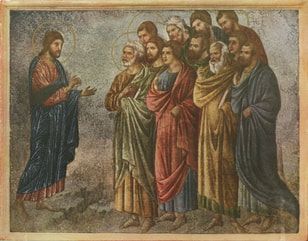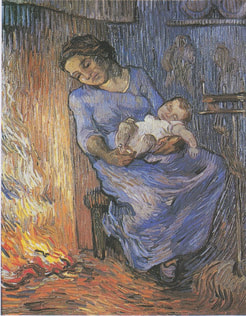 When the song of the angels is stilled, when the star in the sky is gone, when the kings and princes are home, when the shepherds are back with their flocks, the work of Christmas begins: to find the lost, to heal the broken, to feed the hungry, to release the prisoner, to rebuild the nations, to bring peace among the people, to make music in the heart. – Howard Thurman* Now that we are at the beginning of Ordinary Time, in the space between the Christmas season and Lent, it is tempting to slip back into the routine of life outside of the holidays as if that was a time in which we somehow act differently than during the rest of the year. Yes, there is more of a sense of holiday cheer during December, and decorations everywhere are a reminder that it is a festive time, but our behaviors during that time should actually be no different than during the rest of the year. Our liturgical year began with remembrance of the birth of Christ, and therefore it should be a time of renewal in preparation for His return no matter when that is. However, sometimes we act as if we should only remember the return of Jesus during certain seasons such as Advent and Lent and their subsequent “destinations” of Christmas and Easter. This attitude is not intentional on our part, or at least I do not believe it to be so. But we do tend to act as if the only time we should prepare for His return is during those times, while during the rest of the year it is back to ‘business as usual.’ As in the above poem, we are called to live the works of mercy all year, every year, to the best of our ability. And thus, we are called to remember to “make music in the heart” whenever we can. And I might add, this music is not only for our hearts, but rather it is meant to brighten the hearts of others.  The gospel message of Jesus is essentially that we are to reach out to our brothers and sisters whether they are poor or rich, ill or healthy, lonely or accompanied, imprisoned or free, hungry or sated, without faith or spiritually alive, and so on. The works of mercy (Matthew 25) are obviously meant to direct us toward those who are poor in some way, (which is not always about material things), and we are to extend kindness and mercy to everyone. Often when we are going about our daily errands or work we come across people of whom we know nothing; we are constantly crossing paths with scores of people who we barely notice. They are strangers to us, so we have no idea what burdens or joys they might be carrying. As a result we basically ignore each other, going about our individual business, hardly daring to make eye contact. Some of these folks might not look poor, hungry, imprisoned, ill, or naked, and we certainly do not know the nature of their spiritual life, and so we do not think of applying the works of mercy to them. It does not actively come to mind unless, of course, it has become a habit.  Jesus, on the other hand, reached out to everyone with whom He came into contact every time He met people. He ate with “obvious sinners” such as prostitutes and tax collectors, but also with the rich and famous. He preached to anyone who gathered, which included the poor and the rich, the religious authorities and those who barely had any sense of the Scriptures, particularly those who were not Jewish. He did not distinguish between people as to who was more in need of His words or deeds. He simply met the crowds as they came. Granted, there were times when He sought out a particular person or ‘audience,’ but much of the time He was attempting to reach anyone and everyone because He came to gather all people to Himself, not only the Jews. When He sent the apostles out to preach and heal He told them to go to those who would accept them; with the exception of carrying nothing, that was the only instruction He gave. In other words, anyone who was open to the gospel message was to be given it, but if the people rejected them, they were to move on so as not to be mired in contentious conversation, and therefore reach as many as possible. And after His death and resurrection Jesus instructed those same apostles to go out to the entire world: “Go, therefore, and make disciples of all nations, baptizing them in the name of the Father, and of the Son, and of the Holy Spirit, teaching them to observe all that I have commanded you.” (Matthew 28:19-20) And again, “Go into the whole world and proclaim the gospel to every creature.” (Mark 16:16) Mark’s version of Jesus’ instruction includes all the creatures; perhaps this is what motivated people like St. Francis, who was purported to have even preached to the birds! Either way, the message is clear that as we live our daily lives we are to offer the gospel in word, and (especially) in deed, to everyone.  We need to keep our minds and hearts clear. Even though it is now Ordinary Time once again our commitment to Jesus means that we work at growing in faith, aspiring to continue the process of learning discernment, wisdom, and true discipleship. If our Advent and Christmas reflections are to have any efficacy, what we learned must continue to grow: it is fed through our prayer, continued reading of the Scripture, and pondering things in our hearts as Mary taught us to do. Indeed the challenges remain with us, the struggle, suffering, and continual work, but if Christmas had any meaning at all, then our purpose and mission should be (even in the smallest amount) renewed, and should not remain at whatever was ‘status quo’ prior to the season. Our love, kindness, and mercy are needed as much as ever, and our efforts in spreading the work of justice and peace continue to be essential. The powerful still feel threatened and hunger for more power, the evil still conspire, the greedy still have the insatiable desire for more, the hungry still need food and drink, the ill, rejected, and wounded still need care, the naked still need clothes and the imprisoned still need compassion and mercy. Therefore we need to rely upon the gifts we received during the time of reflection upon the birth of Christ. The hope which was promised to us in Jesus (in all the Christmas mysteries), can propel us outward if we continue to actively work with the graces we were offered. These were the graces present on the road to Bethlehem, in the stable on that holy night, when the Magi and shepherds adored, at the Presentation of Jesus in the Temple, and at His Baptism in the Jordan River. These mysteries remind us that we are never alone: Jesus came to save us and He continues to offer the path as well as the guidance to walk it. He provides us with companions and invites us to be a companion.  Though the Christmas season is now over, we need to remember that people still embrace, babies still leap in the womb, angels still sing, shepherds still rejoice, wise people still seek and find, and parents are still awestruck in wonder at the miracle of new life. These joys also remain with us: they are the beacons which remind us that the mysteries of Christmas do not cease. Perhaps we can look to these things as the light we need when the challenges seem to be more than we can handle. No matter what, we must never despair because we are not alone. We are accompanied by those we see (our friends, family and even strangers) and those whom we cannot see (angels, holy souls, saints, and of course, God). Therefore let us move forward in the hope given us in Jesus so that we might not grow tired on the road and that we might “bring peace to people and make music in the heart.” May we strive to continue on the path to holiness! May we continue to see the joy in the Christmas mysteries as we enter into Ordinary Time! May we rise to the challenges which come before us, accepting the graces offered by the Holy Spirit! May we find the courage and strength to open our hearts and minds to strangers and friends alike! May we be ardent in our prayer and faithful in our love! And may we turn to Jesus and His gospel message that we might bring peace to people and make music in the heart! Let us meet at the table of the Lord! Peace! ©Michele L. Catanese * “Howard Washington Thurman (1899 –1981) was an African-American author, philosopher, theologian, educator, and civil rights leader. As a prominent religious figure, he played a leading role in many social justice movements and organizations of the twentieth century.[1] Thurman's theology of radical nonviolence influenced and shaped a generation of civil rights activists, and he was a key mentor to leaders within the movement, including Martin Luther King, Jr.” For more information go to: https://en.wikipedia.org/wiki/Howard_Thurman Note: Next post will be January 29. Images: 1. The first photo is one I took while on pilgrimage in the Holy Land. This is modern Bethlehem. I took this photo from the window of the guest house where we were staying. It was appropriate for the beginning of this post because this is well after Jesus was born in this city, certainly reminding us that we need to make peace a priority: in Bethlehem today only 0.5% of the population is Christian. 2. I took this photo one cold afternoon while visiting a local wine bar in my hometown. I chose to use it here because it shows ordinary people doing ordinary things, but especially because there were people enjoying the company of friend and stranger alike. 3. This painting is Jesus missioning the apostles. Its title is Maestà, altarpiece of the Sienese cathedral, back, altar coronation with Pentecost cycle, scene Apparition of Christ to the mountain of Galilee by Duccio Buoninsegna. (1308-11) I chose to use this here because I liked the rapt attention with which the apostles are listening. You can find more on this painting at https://commons.wikimedia.org/wiki/File:Duccio_di_Buoninsegna_016.jpg 4. This wonderful painting is L'Homme est en mer (The Man is at Sea) by Vincent van Gogh. (1889) The mother is warming herself and her small child by a hearth while her husband is away at sea, or so the title indicates. I love the peaceful expression on the face of both mother and child. I wonder if the mother was pondering over what her child's future life might be like, perhaps similar to the prayerful thoughts of Mary about her child, Jesus, when He was small. For more go to https://commons.wikimedia.org/wiki/File:Van_Gogh_-_Der_Mann_ist_auf_See_(nach_Demont-Breton).jpeg 5. The last image is the Viriditas Triptych by Fr. William Hart McNichols from his larger work called Viriditas - Finding God in All Things. I chose this as a reminder that we live in a beautiful world; we must not lose sight of the opportunities given us by God to enjoy the beauty of it as well as to work toward keeping it from decay. Also, the earth surrounded by the tongues of fire is a reminder that we are never alone. The triptych can be found at http://frbillmcnichols-sacredimages.com/featured/viriditas-triptych-william-hart-mcnichols.html Comments are closed.
|
Heart Speaks to Heart
|

 RSS Feed
RSS Feed

